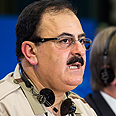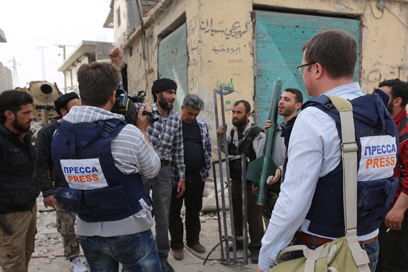
Gen. Salim Idriss
צילום:AP
Syrian opposition: Conflict will be decided in summer
Senior American columnist David Ignatius believes post-Assad era will be just as unstable, dangerous; claims US influence limited
WASHINGTON - Syrian opposition sources believe that the battle for Damascus is nearing and that the conflict with forces loyal to President Bashar Assad will be decided this summer.
Following a number of meetings with leading opposition figures in Turkey, David Ignatius published Wednesday a piece in the Washington Post claiming that in "absence (of) some diplomatic miracle" the Syrian conflict is likely to culminate in chaos and bloodshed.
Related stories:
- Syria's 8-year-old rebel exposed
- Report: Rebels 2 km from Assad's largest WMD cache
- Syrian opposition's print revolution
The writer's first conclusion is that the US will have only minimal influence on the situation, even if it does in fact decide to boost support for opposition forces.
His second conclusion is that in the period following Assad's fall, Syria will be plunged into chaotic disarray, no less violent and unstable than the current situation. Bands of Muslim rebels will vie to gain control over Assad's weapons arsenal, including chemical.
The Free Syrian Army conducted a mapping of the different rebel and opposition forces, their ideological background and their different benefactors. The document was handed to the US State Department. According to the document, most of them have Islamic roots in neighboring Arab countries and enjoy the strong support of Saudi Arabia and other Gulf states.
Ignatius noted that despite the fact the conflict is over two years old, the rebels have failed to consolidate a central command.
"Gen. Salim Idriss, commander of the Free Syrian Army," which numbers around 50,000 fighters, Ignatius claims, "has tried to coordinate the fighters. But this remains a bottom-up rebellion, with towns and regions forming battalions that have merged into larger coalitions. "

Rebels on Aleppo (Photo: EPA)
The largest "umbrella" group currently fighting Assad is Jabhat al-Tahrir al-Souriya al-Islamiya, which commands a force of 37,000 fighters from different regions in Syria.
This group enjoys Saudi support, and, according to Ignatius, the group's members are not "hard-core Islamists but are more militant than the political coalition headed by Sheik Moaz al-Khatib, who last week claimed Syria’s seat in the Arab League."
Second in line in terms of strength, numbering 13,000 forces, is the most radical and Islamist of all rebel groups, comprised of "hard-core Salafist Muslims," also Saudi backed and funded by "wealthy Saudi, Kuwaiti and other Gulf Arab individuals. Rebel sources count 11 different brigades from around the country that have merged to form this second coalition."
The third rebel group, funded mainly by Qatar, is Ahfad al-Rasoul and has around 15,000 forces.
However, "the most dangerous group in the mix is the Jabhat al-Nusra," numbering around 6,000, which the columnist says "is an offshoot of al-Qaeda in Iraq."

Jabhat al-Nusra fighters (Photo: Reuters)
This group fears the West and its counterterrorist culture, and hence has been keeping a low profile, for now, and will perhaps join forces with the Salafist group at some point in the not so distant future.
The well connected columnist writes that "the best hope for US policy is to press the Saudi-backed coalition and its 37,000 fighters, to work under the command of Idriss and the Free Syrian Army."
This would, according to rebels, strengthen and legitimize Idriss, and according to Ignatius, "bring a measure of order (that) would open the way for Idriss to negotiate a military transition government that would include reconcilable elements of Assad’s army."
He concludes by citing rebel sources who claimed they are currently developing "plans to train Syrian police, purify water supplies and teach forces how to dispose of chemical weapons — all pending approval. Such plans offer the best chance for mitigating the Syrian disaster. What is the United States waiting for?"
- Receive Ynetnews updates directly to your desktop










